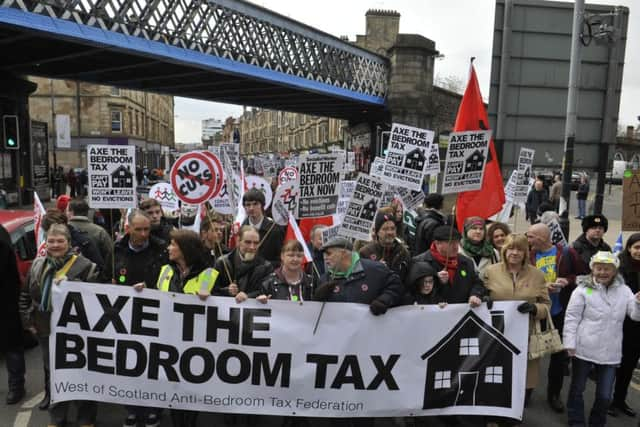Emma Flood: Bedroom tax ruling could free up welfare cash in Scotland


On 27th January, the Court of Appeal in England & Wales ruled on two cases brought against the UK Government.
In both cases, it was held that the ‘bedroom tax’ was not compatible with the European Convention on Human Rights (ECHR) and as such, is discriminatory.
Advertisement
Hide AdAdvertisement
Hide AdThe ruling will be welcomed by the Scottish Government, which has battled the bedroom tax from the beginning, supplementing the income of those affected to mitigate their loss of finances.


But, what does this ruling mean for the bedroom tax legislation and how does this affect Scotland?
Will the bedroom tax be scrapped?
The bedroom tax was introduced in 2013 as a means to free up council properties by incentivising people to move from homes considered to have more bedrooms than was deemed necessary. However, the policy has been, and continues to be, highly criticised for failing to consider the personal circumstances of certain individuals and families.


The first of the two cases heard by the Court related to a person who had been a victim of extreme domestic violence. Having conceived her child through rape by the same perpetrator, the appellant was part of the Sanctuary Scheme, which reinforces the security of vulnerable individuals fearful of domestic violence. She required her additional room in her home as a panic room.
The second case involved a grandmother who cares for her grandchild suffering from a rare genetic condition, meaning he requires 24-hour care. The additional bedroom in their home is used by overnight carers, and to store equipment her grandson needs to facilitate his care.
In both of these circumstances, the Department of Work and Pensions (DWP) reduced the appellants housing benefit under the Removal of the Spare Room Subsidy (RSRS) legislation, more commonly known as the bedroom tax, as they were deemed to be over-occupying.
However, DWP failed to take into account the personal circumstances of the parties, making the policy discriminatory under Article 14 ECHR.
Article 14 ECHR protects people in the UK from discrimination by public bodies. This protection includes where the government or a public body fails to treat an individual differently where their circumstances are different, putting the individual at a disadvantage, or where an apparently neutral policy has a disproportionate impact on certain groups, such as women or people with a disability.
But what does this mean for the bedroom tax?
Advertisement
Hide AdAdvertisement
Hide AdWhere an Act of Parliament is deemed by the courts to be incompatible with Human Rights, this does not affect the validity of the law. Instead, the ruling is inviting Parliament to reconsider the law in light of the decision. The DWP has made clear that they intend to appeal this ruling to the UK Supreme Court, which means, as a result, that there will be no immediate changes. However, a loss for the DWP in the Supreme Court could mean the end of the bedroom tax, or introducing changes to take into account the circumstances of each person or family.
How does the bedroom tax affect Scotland?
Local Authorities in Scotland currently make up the shortfall in tenants’ weekly rent where the household is affected by the bedroom tax through Discretionary Housing Payments. The Scottish Government is committed to reimbursing Local Authorities for this cost. According to a briefing by Scottish Parliament Information Centre (SPICe), it was estimated that the average Scottish household affected by the bedroom tax would lose around £11.72 per week from their household income.
Figures produced by Scotland’s chief statistician, outline that the Scottish Government will spend almost £9million - £1.5million in Glasgow alone - this year, mitigating the effect of the bedroom tax on Scottish people and families. This figure does not take into account the administrative costs of processing the additional applications from tenants who require funding solely as a result of the bedroom tax.
The Scottish Government is due to reimburse Local Authorities for their bedroom tax spend in May 2016, following the end of the tax year.
However, according to a SPICe briefing on Discretionary Housing Payment, there are some tenants across Scotland who are falling into rent arrears as a result of the bedroom tax, who have not yet made applications. This demonstrates that while the Scottish Government is working to mitigate the effects of the bedroom tax, the system is still failing those who need housing payment support the most.
The figures and Scottish Government publications indicate that scrapping the bedroom tax would result in fewer Discretionary Housing Payment applications, and fewer tenants falling into rent arrears. As a result, changes to the law brought about by the bedroom tax incompatibility ruling will be welcomed by the Scottish Government and Local Authorities.
SNP spokeswoman on Social Justice and Welfare, Dr Eilidh Whiteford MP, said:
“We welcome this ruling and call on the Tories to scrap this unfair and discriminatory tax on some of the poorest and most disadvantaged people in our society.
Advertisement
Hide AdAdvertisement
Hide Ad“This is a tax that has no support but hits disadvantaged people. It epitomises the uncaring, unthinking and ultimately self-defeating approach of this Tory government.”
“In light of this ruling - and the overwhelming evidence of how detrimental this policy has been – the UK government must now think again.”
Curated Media’s Emma Flood is a creative content specialist for law firms.